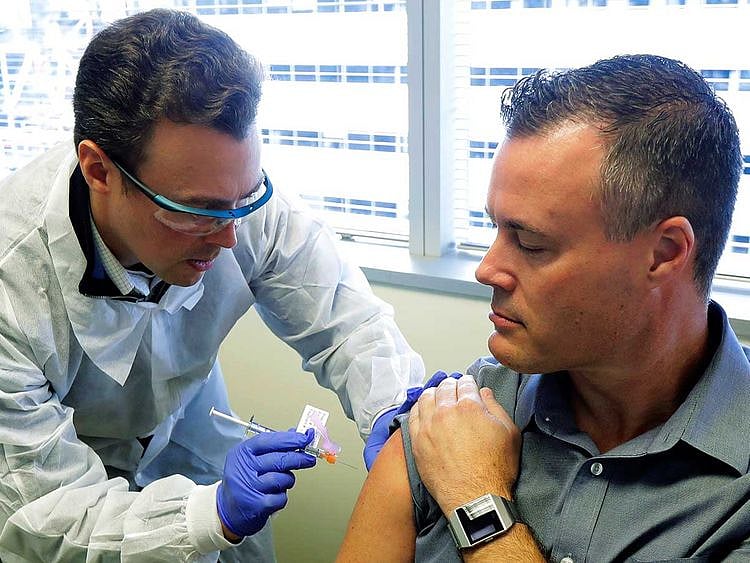Coronavirus: How soon will a vaccine be ready?
The first clinical trial has started, but there’s still a long way to go

Is there a cure? Is there a vaccine? These questions were asked time and again after the coronavirus broke out in the Chinese city of Wuhan. Unfortunately, there are none. There are no approved treatments or vaccines for the COVID-19 virus and other coronaviruses, like SARS and MERS.
Takeda Pharmaceutical Co. says it’s closing in on a cure for the new coronavirus. The Japanese company says its plasma-derived therapy has the potential to become the first approved treatment, according to Bloomberg. Its confidence is based on the fact that the treatment involves a process that has already been approved by the regulators.
The first experimental vaccine
Around 35 companies and research institutions are racing to develop a vaccine to combat the COVID-19 virus. Moderna is the first to reach a clinical trial.
The Boston-based biotech firm launched the first human trials of the experimental vaccine on Monday. The tests, which are being conducted at Kaiser Permanente Washington Health Research Institute in Seattle, aim to find out if the vaccine is safe.
The trials were "launched in record speed," Dr Anthony Fauci, director of the National Institute of Allergy and Infectious Diseases, said in a statement.
The speed is unprecedented, and it was possible because researchers were able to use what they already knew about other coronaviruses that had caused diseases outbreaks like SARS and MERS, the New York Times said.
If another type of virus had caused the outbreak, it could have taken months longer to create a potential vaccine, Dr Barney Graham, the deputy director of the institute's Vaccine Research Centre.
More vaccines on the way
Russia and China say they too have made rapid strides towards developing immunisation for the coronavirus. The People's Daily said China has authorised clinical trials on a vaccine developed by researchers led by Chen Wei of China's Academy of Military Medical Sciences.
A Russian biotech institute official said their scientists have begun to test vaccine prototypes, and plan to present an effective one by June, AFP reported. “We are starting laboratory testing on animals, to ensure effectiveness and safety,” Ilnaz Imatdinov of the Vector Institute in Siberia told the Vesti Novosibirsk television channel on Monday.
What is a vaccine?
A vaccine is a substance that trains the body’s immune system to fight a disease even before a person contracts it. It is not a cure. But it merely stimulates the immune system to produce antibodies to fight viruses or bacteria.
How does a vaccine work?
The basic principle is the same for all vaccines. A part or weakened forms of the pathogen is introduced to the immune system through an injection and at a low dose. That will prompt the immune system to produce antibodies, and they have immune memory which can be quickly reactivated if the person is exposed to the pathogen.
Trump and the German firm
While drugmakers around the world are scrambling to find immunisation for the new coronavirus, a German biotech firm grabbed the headlines for the wrong reasons. Die Welt newspaper reported that US President Donald Trump had offered "a billion dollars" to secure research into a vaccine by CureVac "only for the United States". The report was swiftly denied by the company.
US drugmaker Pfizer Inc, Germany's BioNTech SE, Roche and many others are pulling out all stops to find a vaccine. Moderna’s vaccine is the first to reach the testing stage. If there are no hitches, the vaccine will be ready only in 18 months.
“I don’t think this vaccine will be ready before 18 months,” Annelies Wilder-Smith, professor of emerging infectious diseases at the London School of Hygiene and Tropical Medicine, told The Guardian. That’s extremely fast.
Why’s the vaccine delayed?
Moderna uses genetic material — messenger RNA — to make its vaccine, called mRNA-1273. But no vaccine made with this technology has reached the market, says the New York Times.
The Moderna trial involves 45 adults and each will receive two shots, 28 days apart. Three different doses will be tested and the participants will be monitored for a year. The second phase will involve several hundred people to measure the efficacy and verify the safety of the vaccine. During the third phase, it will be tested on thousands of people.
The race for vaccines
Even if the vaccine is ready in 18 months, there are more challenges. It will have to be produced in massive quantities, and not many firms don’t have the capacity to produce it on a large scale. The bigger challenge is to supply to those who need it the most.
When a vaccine is available, COVID-19 “will probably have peaked and declined”, says Wilder-Smith, who also serves as a consultant to the Initiative of Vaccine Research at the World Health Organisation. But it will help fight future outbreaks.
Let's not wait for the vaccine. Keep washing your hands.
Also Read
Coronavirus: How to practise social distancing for better health? Pictures: How humans slowing down due to coronavirus has had an impact on our planetMales more vulnerable to coronavirus: AIIMS DirectorCoronavirus: The terms you need to knowCoronavirus: Your blood type may make you more vulnerable, says studyNetwork Links
GN StoreDownload our app
© Al Nisr Publishing LLC 2026. All rights reserved.